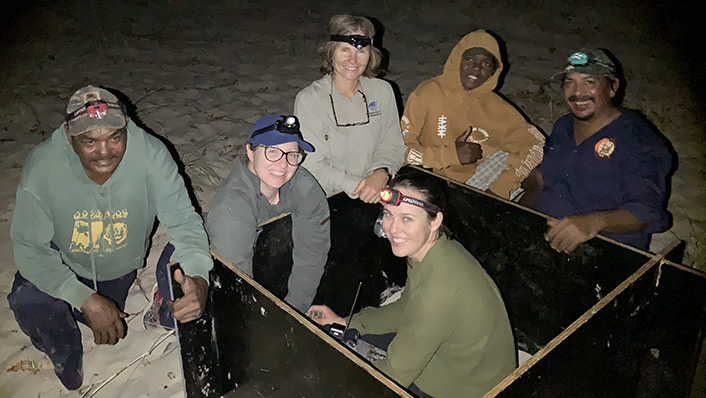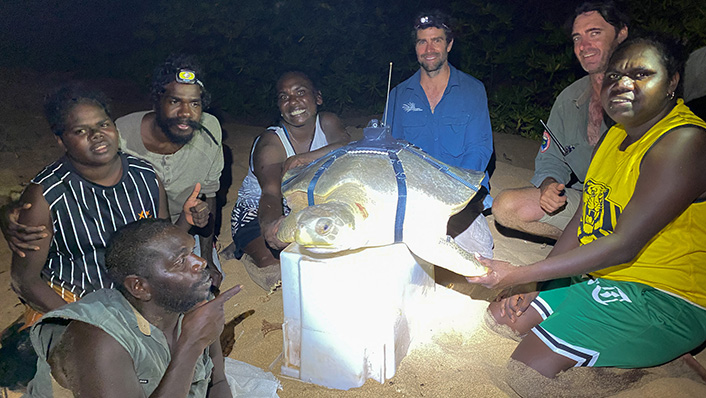Tagging technology that enables large marine animals to effectively become ocean-going explorers are helping scientists and Indigenous rangers learn more about threatened turtle species and remote ocean environments off the Northern Territory coast.
Special satellite tags have been fitted to olive ridley turtles on the Tiwi Islands and flatback turtles at the remote North West Crocodile Island by Indigenous sea rangers and scientists.
The tags track the turtle movements and thus give scientists and managers a better understanding of turtle habitats and behaviours around the islands and beyond to inform conservation and management decisions. The tags also collect temperature and salinity data from the ocean as the turtles dive that will be used by scientists to understand the oceanography in the little-studied Arafura Sea.

AIMS scientist Dr Michele Thums, who led the field trips said: "All marine turtles are threatened and this collaboration allowed us to collect information that will help us determine which areas are most important. With Traditional Owners and managers, this information can be used to refine the designation and protection of areas critical for turtle nesting and feeding."
Dr Rob Harcourt, Leader of the IMOS (Integrated Marine Observing System) Animal Tracking Facility, Project Leader and participant in the NW Crocodile Island field trip said: "The tags will also help us collect valuable information on the changing condition of the oceans around both sets of islands.
"The Arafura Sea is one of the regions around Australia where it is difficult and expensive to collect information so the turtles are really helping us out."
During the trips to tag the turtles last year, the researchers provided training to the Aboriginal rangers on turtle monitoring and tagging techniques.
Each of the tagged turtles were named by the rangers after female family members and initial data shows that some have travelled hundreds of kilometres away from the islands since bring tagged.
Tiwi and Crocodile Islands are major nesting locations for olive ridley and flatback turtles respectively. Olive ridley turtles are classified as an endangered species in Australia. They occur in mostly coastal waters, especially in soft bottomed habitats. The Tiwi Islands are recognised as one of the most important nesting areas in Australia and the Pacific region.

The flatback turtle nests only in Australian waters and is classified as vulnerable. They prefer shallow, soft-bottomed seabed habitats away from reefs.
Tagged marine animals collecting information on the environment have advanced our understanding of the world's oceans and the habitat use of some of its important species. Species including elephant seals have been fitted with these specialised tags to contribute important ocean temperature and salinity data from poorly sampled regions like the Southern Ocean.

The tagging projects are a collaboration between the Australian Institute of Marine Science (AIMS), the Department of Defence, the Integrated Marine Observing System (IMOS) and the Sydney Institute of Marine Science. The Tiwi Islands Marine Rangers, Tiwi Resources the Tiwi Land Council, and Charles Darwin University partnered with the scientists on the Tiwi Islands trip. On Crocodile Island, the team collaborated with the Crocodile Islands Rangers and Milingimbi Outstations Progress Resource Aboriginal Corporation (MOPRA). Traditional Owners of both sites gave consent for the team to work on their sea country and on these culturally important species.
Feature image courtesy of Britten Syd Andrews






